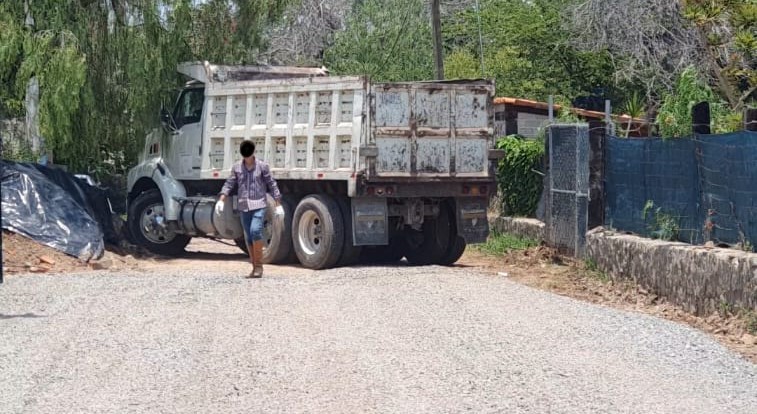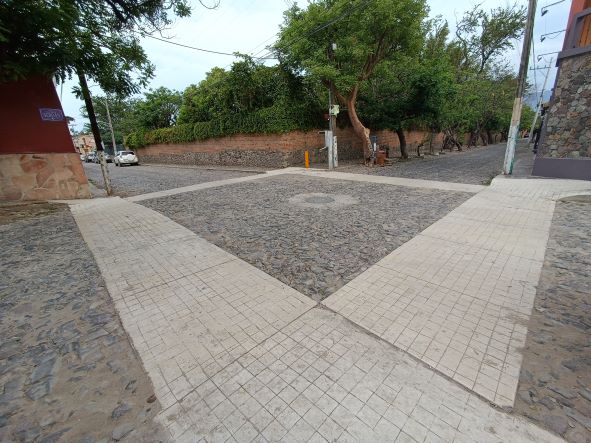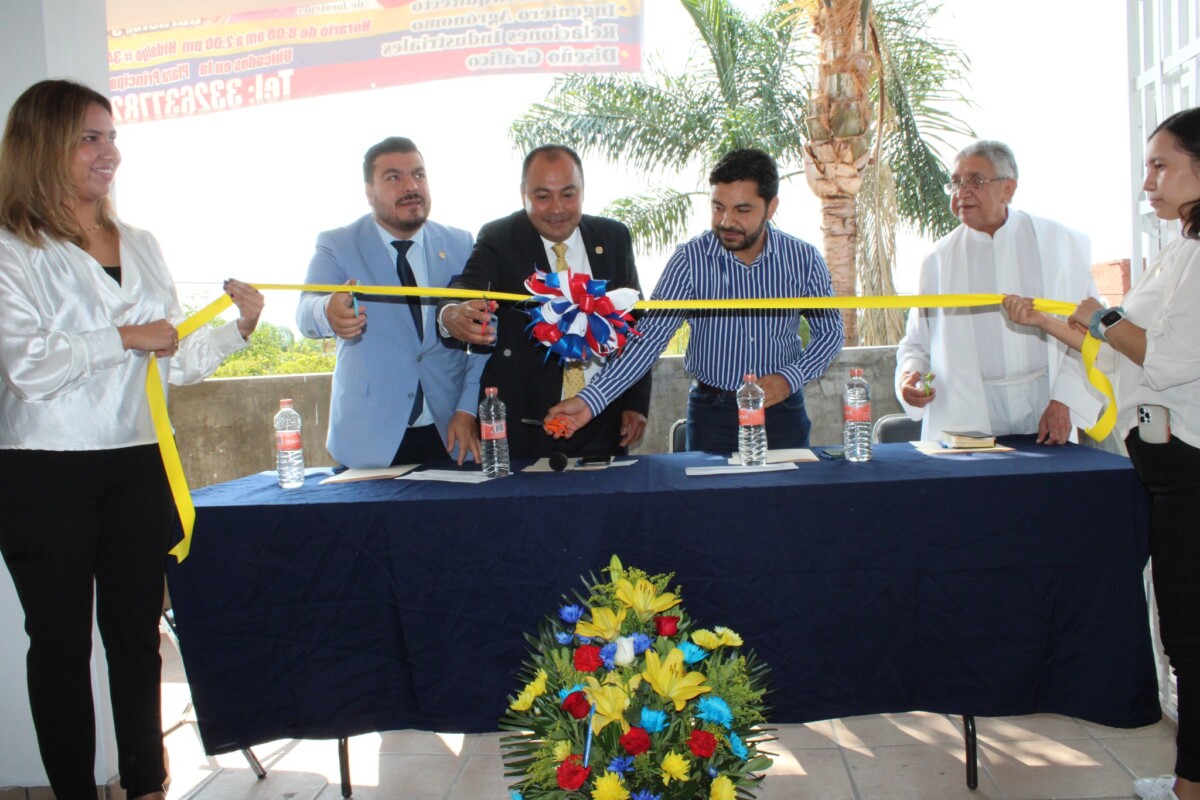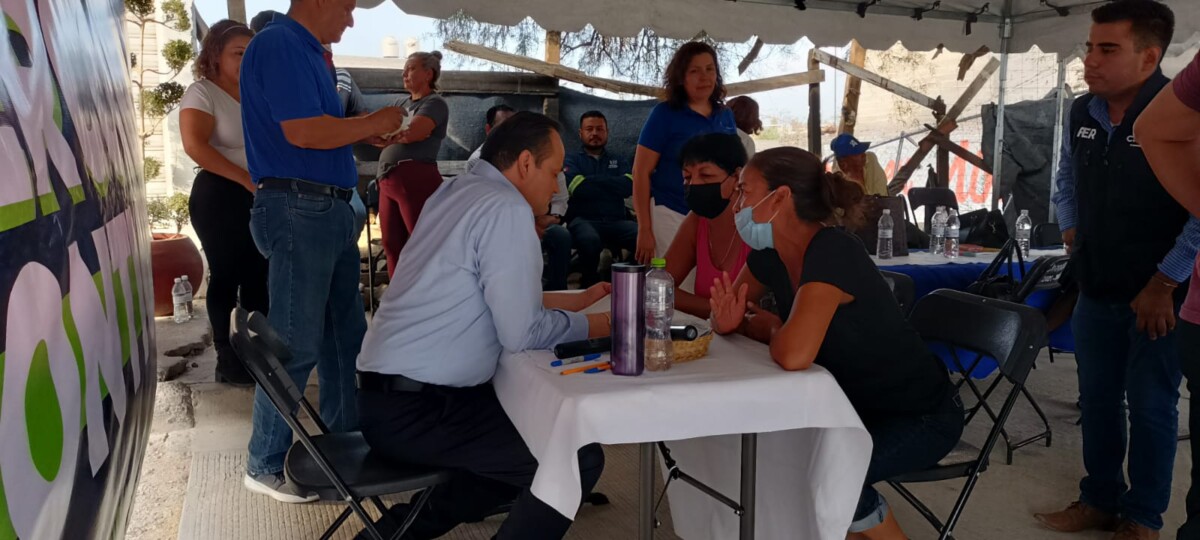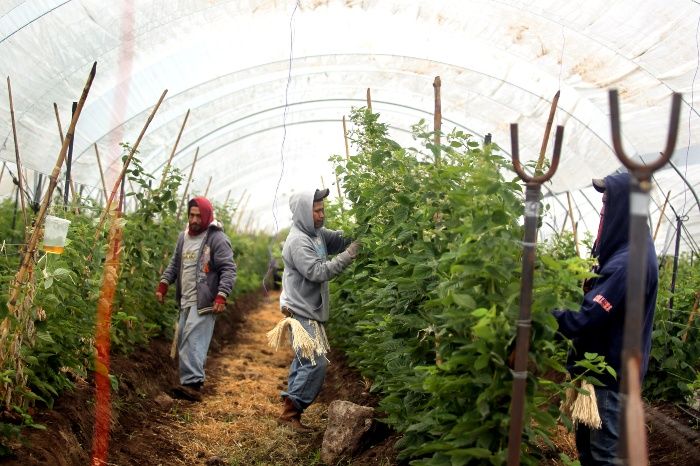Localidades
Se identifican tres nuevos casos sospechosos de viruela símica en Jalisco
Uno de los síntomas de esta viruela es la aparición de erupciones cutáneas. Foto: Cortesía.
Redacción.- La Secretaría de Salud Jalisco (SSJ) identificó tres nuevos casos sospechosos de viruela símica el pasado 24 de junio, tras las acciones de vigilancia epidemiológica en todas las unidades médicas del estado.
La SSJ informó que a los pacientes se les indicó aislamiento domiciliario por 21 días y se les dará seguimiento epidemiológico. Se les tomaron pruebas que se enviaron al Instituto de Diagnóstico y Referencia Epidemiológicos «Dr. Manuel Martínez Báez» (InDRE), autoridad que deberá confirmar o descartar la infección.
El primero de los casos de la nueva notificación corresponde a un hombre de 34 años originario de Puerto Vallarta, con antecedente epidemiológico de contacto con extranjeros, quien el pasado 15 de junio inició con síntomas como fiebre, máculas, pápulas, pústulas y prurito, en cabeza, tórax y extremidades inferiores.
El segundo corresponde a un hombre de 30 años, residente de Zapopan, con antecedente epidemiológico de contacto con extranjeros, quien el pasado 16 de junio presentó fiebre, máculas en palmas plantas y tronco.
El tercer caso se trata de un hombre de 42 años, residente de Puerto Vallarta, con estancia temporal en EUA, quien arribó a México el pasado 23 de junio con síntomas como fiebre, máculas en cara y tronco, antes de llegar al país refirió contacto con una persona que manifiesta cuadro clínico similar.
Al momento, Jalisco registra un total de cinco casos confirmados, tres casos sospechosos y dos casos descartados. La SSJ ha atendido a 55 personas y están en seguimiento 52 personas.
New backfilling in federal zone invaded by «El Torero»
Filling trucks leaving the invaded lot.
Editor.- Neighbors of Riberas del Pilar again denounced landfills with debris on federal land in the area allegedly invaded and terraced by Alfredo Ríos Becerra «El torero».
Debris trucks were reported entering the property -which is already fenced with a stone wall- during midday on Tuesday, June 14. Some neighbors quickly began to record and disseminate the video, as they claim that the police reports have not been of any use. In the end, the alleged perpetrator and the trucks left the site.
One of the neighbors recalled that he has been protesting this action since 2017, as well as the work that has been carried out within the same lot. He also said that this space located on Paseo del Lago Street, between San Mateo and San Pablo Streets, was the only one in all Riberas del Pilar where there was no illegal building or filling until the arrival of Alfredo Ríos. There has been a long history of complaints, which resulted in two closures of the lot and the visit of inspectors from the National Water Commission (Conagua). However, this did not prevent Rios from continuing with the construction works of the wall and stables and obtaining basic services.
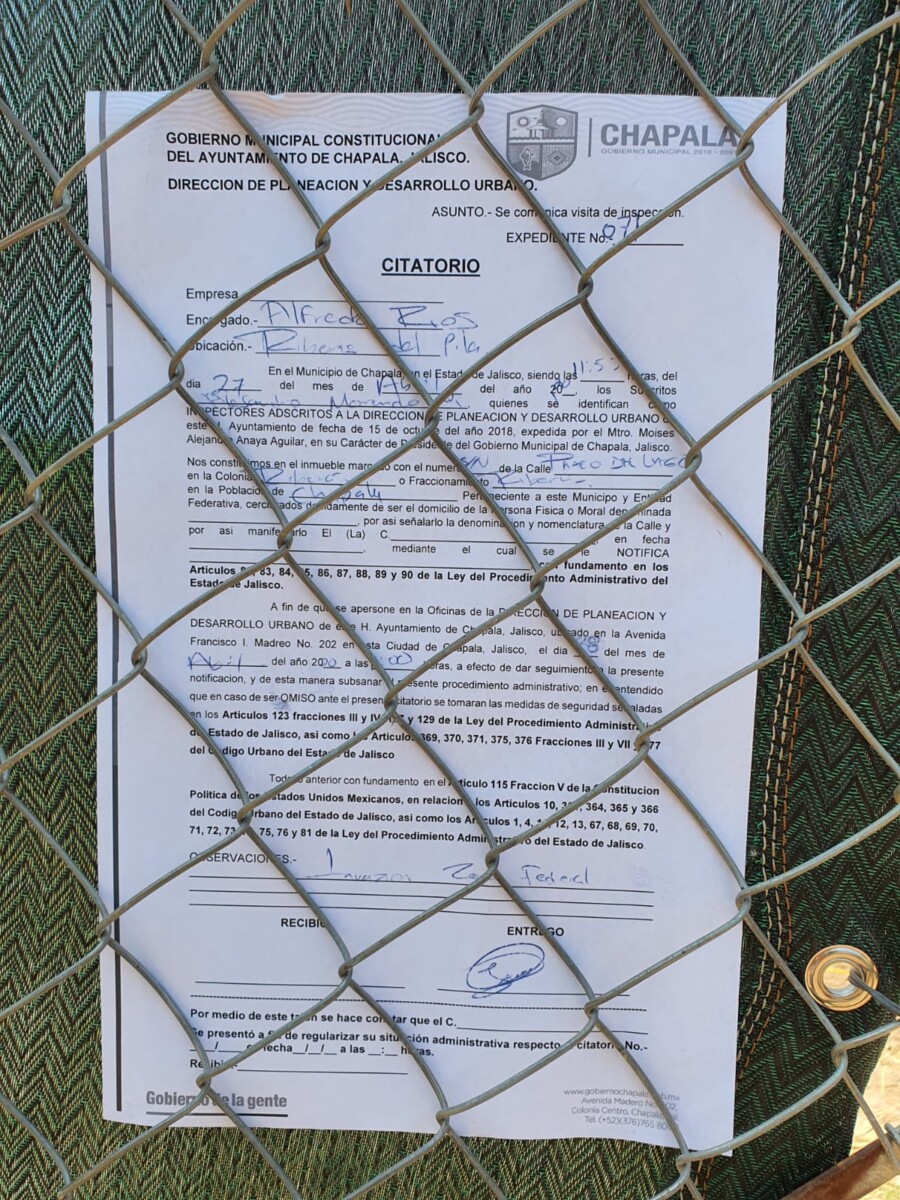
One of the notices of closure on a lot invaded during the 2018-2021 administration.
«If you go and ask in Transparency(Mexicans version of a Freedom of Information request) for the reason why the closures were removed, with the file number that was originally assigned to these complaints, placed there is no document. Conagua and the Federal Attorney’s Office for Environmental Protection (PROFEPA) have already been informed, and they do not take action.. Conagua inspectors came when the water was up, and they left saying that it was flooded, that there was nothing to do, even though it was already fenced in and they were already starting to build the El Torero wall,» said the complainant.
The citizen also complained about the lack of attention of the municipal authorities in the two administrations prior to the current one – 2015 to 2018 headed by Javier Degollado González, and 2018 to 2021 by Moisés Alejandro Anaya Aguilar – for allowing the Municipal Potable Water and Sewage System (SIMAPA) to have a water intake and not properly managing power connections.
. «With all this, there is no desire left to continue protesting the project before the new administration takes office .» he said.
Another dissatisfied neighbor shared the situation of the land with the indigenous community of San Antonio Tlayacapan, who currently has the concession of that space. It is a concession for agricultural use, owned by a resident of the delegation, with an extension of 100 meters in front and 50 meters deep. According to the testimony, Alfredo Ríos had threatened and intimidated him so much that the owner decided to hand over the concession to the community so that they could take over the land.
When they were given the concession, «El Torero» was already working in the area, and they were only able to rescue a little more than a third of the land, approximately 35 meters of frontage, leaving the alleged invader 75 meters of frontage. «Conagua did not resolve the situation denounced by the concessionaire due to a drafting error in the complaint, and no work has been done on planting, because the water level is still high», he mentioned.
The Social Communication department of the Government of Chapala took note of the situation and communicated that people who protest , need to do so immediately, so the government can quickly arrive and intercept the offenders, and thus initiate the corresponding process, in addition, they provided the following number, exclusive for this type of complaints : 33 3446 4362.
Translated by Patrick O’Heffernan


Ajijic crosswalks project resumes; citizens want input
The only concrete crosswalk in Ajijic, which was built during the last administration. This project was not well received by Ajijitecos when it was proposed. Photo: Sofía Medeles.
Sofia Medeles (Ajijic).- Following the announcement by the Chapala government of the investment of more than 13 million pesos in different projects for the municipality, including the construction of 10 crosswalks in Ajijic, citizens were concerned, hoping that this time the project could be reviewed by the citizens before being carried out, a step the last administration skipped.
Semanario Laguna interviewed 25 people from different parts of Ajijic, of which 23, – more than 90 percent- , agreed that the design should be submitted to the citizens for discussion
The crosswalks would be distributed along different streets of the main square of Ajijic and would cost 834,740.30 pesos. This budget would be available for the project in August of this year.
Most of those interviewed agreed that it is a good project, especially after the designation of Pueblo Magico, since being a tourist destination requires accessibility for all types of pedestrians; the only thing that citizens ask is that it be a project in which both the design and the materials to be used for its construction are available to the citizens fr review and input.
Of the 23 who wanted input on the project, 12 commented that it is very important that the people be taken into account, and that there are priorities that should be considered before the crossings.
«What is the use of a good crossing, nice and even, so that, for example, a person in a wheelchair can pass, if on the sidewalk they are going to run into all kinds of barriers. Poles, steps, cracks. The project should be a little more coherent – coordinated with other improvements. In addition, there should also be traffic education for those who drive on the streets or trucks on the streets, because the crossings may be very nice, but they are going to erode quickly with the passage of all those vehicles,» said Joel.
On the other hand, Monica, one of the two people who disagreed with the need for a citizen review of the project, felt that subjecting the project to a review by all the people would generate «chaos».
«We all have different visions, and it would be very difficult to reach an agreement,» she added.
In this regard, Acting Delegado Maximiano Macías Arceo said that although he would like the project to be reviewed by the people he does not know for sure how it will be handled by the Chapala City Council.
«For my part, I did ask that it could be discussed with the people and that something be done that matched with the streets of Ajijic, with beautiful and well set stone. It is necessary to understand the advantages of these projects; recently people from the state Director of Inclusion of People with Disabilities came and inspected our streets and crossings and found them inadequate; a project of this type is needed».
Something similar should have been done during the last administration – 2018 to 2021- headed by the former mayor Moisés Alejandro Anaya Aguilar. In mid-2019, work began on the construction of the first and only intersection on Aquiles Serdán Street with Ocampo after a survey was conducted to find out what would be done with the budget, within the practice of «participatory budgeting».
Ajijic residents were upset when they saw the materials that would be used in the project. They pointed out that the use of cement was never specified. After multiple complaints, the construction was stopped, leaving only one completed. Another survey was made about the material in the crossings, with river stone set in cement being the most popular.. After a few months, the then municipal president ended the project, saying that he would not be «infatuated» with doing something that the people did not want.
Translated Patrick O’Heffernan


Contradicen testigos al Ayuntamiento de Chapala por liberación de presunto acosador ‘por falta de denuncias’
Momento de la captura de Leo “N” el pasado martes 31 de mayo. Foto: Cortesía.
Sofía Medeles.- Pese a que Comunicación Social del Gobierno de Chapala informó que el presunto acosador detenido, identificado como Leo “N”, habría sido liberado por haber cumplido con las horas de la sanción administrativa y por no haber denuncias en su contra, testigos y denunciantes aseguraron que hubo al menos seis interpuestas en el Ministerio Público (MP).
La declaración por parte del Ayuntamiento fue brindada el mismo día de su liberación, es decir, el pasado jueves 2 de junio, motivo por el que los denunciantes compartieron a Laguna sus testimonios en contra del señalado.
Dos personas, quienes que optaron por el anonimato por temor a represalias, aseguraron contar con un folio de carpeta de denuncia -a la cual este medio tuvo acceso-, además, aseguraron que mantuvieron contacto con al menos otras cuatro personas que denunciaron entre el día de la detención de Leo “N”, martes 31 de mayo, y el día siguiente, es decir, miércoles 1 de junio.
Aunque no mencionaron una causa o delito por el que denunciaron, comentaron que los testimonios de los denunciantes fueron similares. Los testigos creen que el delito podría ser acoso, o toma de fotografías de menores de edad sin su consentimiento.
“Nos encontramos con muchos conocidos, hasta les ayudamos a reunir los papeles que necesitaban. En los casos con menores de edad, a los niños los pasaron con psicólogo, y después de eso, nos citaron hasta septiembre. Solo en un caso le citaron en Poncitlán, le volvieron a pedir la declaración, y le dijeron que le hablarían cuando hubiera actualizaciones”, comentó una entrevistada.
Aunque los oficiales de policía municipal, y demás autoridades exhortaron a la población afectada a denunciar, al final, se emitió la postura de que no había ninguna denuncia, ante el Ministerio Público. Esto, junto a la liberación del señalado, desmoralizó a las personas que iniciaron con procesos en el Ministerio Público, ya que no le ven caso a seguir con los trámites si el sujeto se encuentra en libertad, y según rumores, lejos de Ajijic.
Además, compartieron que, en el transcurso de sus denuncias en el MP del municipio, el personal de la dependencia fue cortante, carente de empatía, y falto de apoyo en la explicación del papeleo a quienes acudieron a denunciar.
Una estudiante de leyes, quien prefirió omitir su nombre, señaló sobre el actuar de las autoridades en la liberación del individuo, que podría deberse a varias razones que hacen que el caso no sea tan grave, como la posible condición mental de Leo “N”, o que el delito de acoso no es tan severo como para tener a alguien en situación de cárcel mientras se hacen las averiguaciones correspondientes, y que en estos casos, es probable que otorgue una medida cautelar, como lo es ir a firmar cada mes a las oficinas del MP.
Finalmente, las personas afectadas dejaron un mensaje a las autoridades estatales, preguntando qué tiene que pasar o qué esperan para que intercedan.
“Esperan que secuestren o abusen de alguien”, manifestó uno de los testigos. A raíz de esto, también mencionaron que por eso ocurren tantos casos de “justicia por mano propia», al ser ignorados y que no haya figura que preserve su seguridad.
With URIT, university classes come to Jocotepec
Inaugural ribbon cutting. Photo: Government of Jocotepec.
Editor.- Jocotepec now has a university. The Regional University of Tequila (URIT) opened a campus in Jocotepec June 4, starting with 11 degree programs.
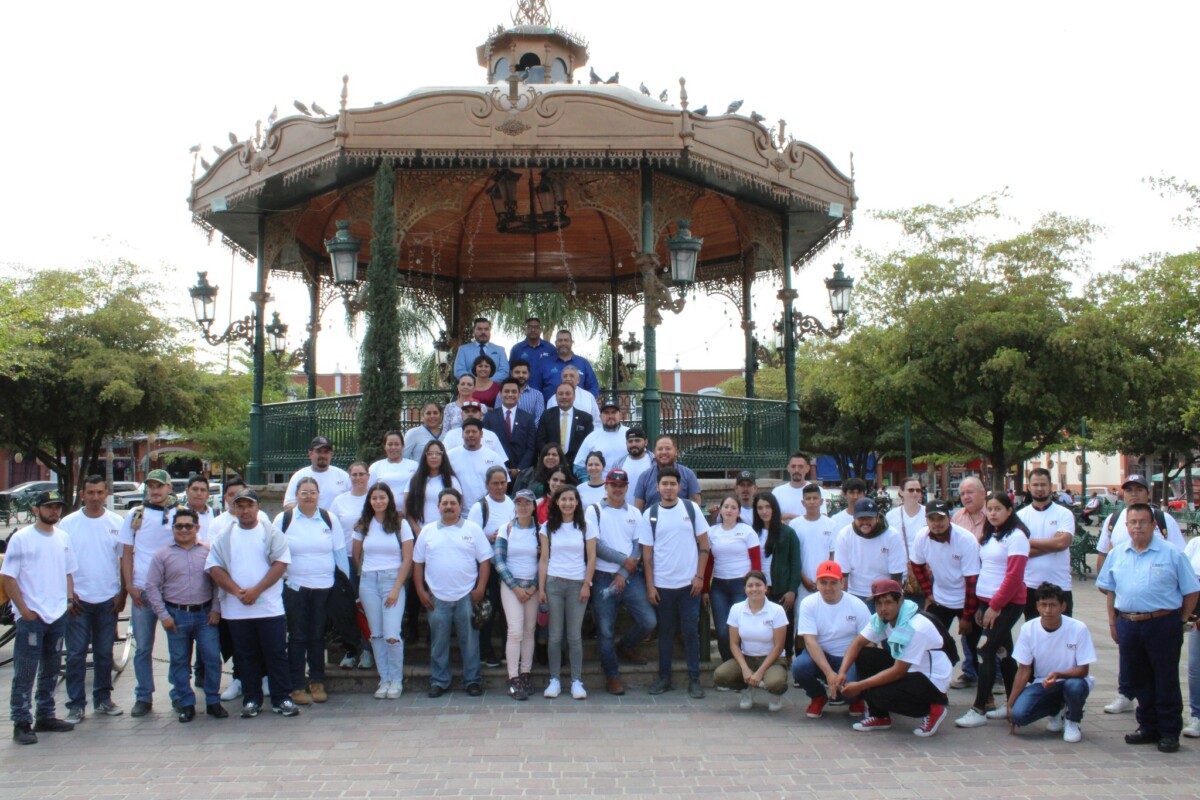
URIT Jocotepec, already has students. Photo: Government of Jocotepec.
Present at the opening were Juan Diego Calderón Rodríguez, general rector of the university council, Moisés Rodríguez Huerta, vice rector, Carlos Alberto Zúñiga Chacón, municipal trustee, and Father Jesús Quiroz Romo, who blessed the facilities, academic staff and students.
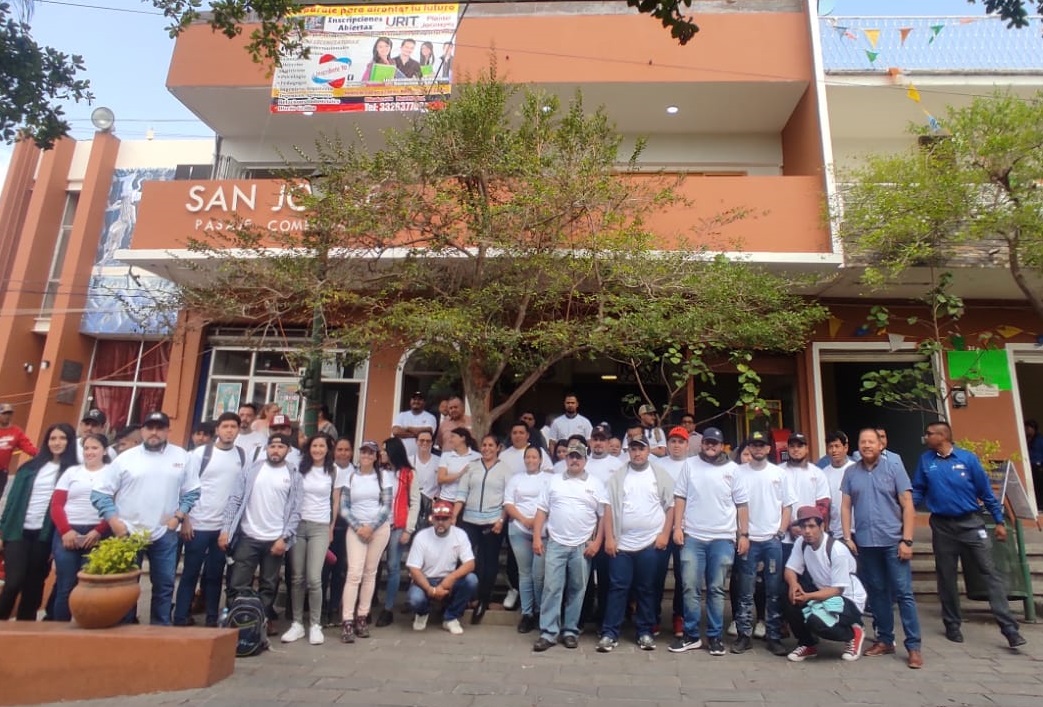
The facilities are located next to the access to the San Jorge passage in the Jocotepec plaza. Photo: Government of Jocotepec.
URIT Jocotepec offers studies in International Business, Administration, Accounting, Law, Nutrition, Psychology, Pedagogy, Architectural Engineering, Agricultural Engineering, Industrial Relations and Graphic Design.
«Bringing the campus to young people allows them to receive the same education right here. We are continuing to break ground in Lake Chapala municipalities in order to bring affordable and convenient education,» said Rector Juan Diego Calderón Rodríguez during an interview.
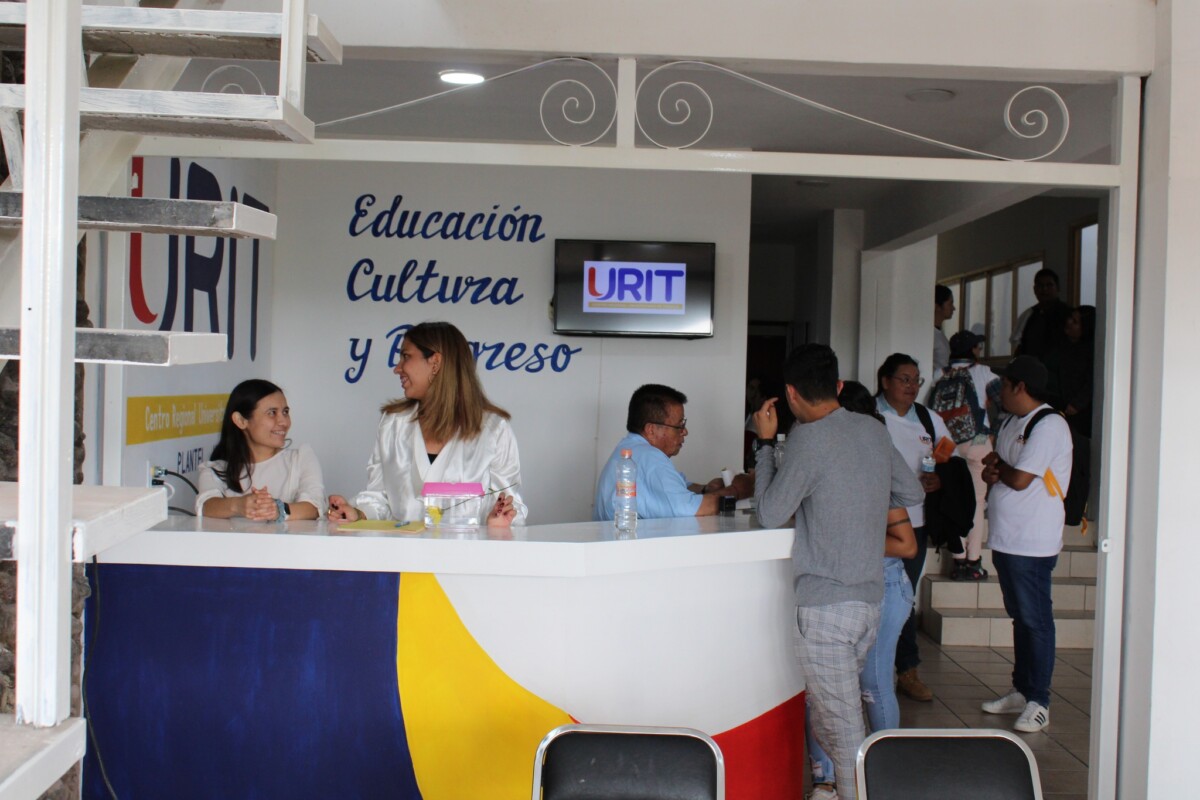
Part of the school facilities. Photo: Government of Jocotepec.
The campus plans to offer bachelor’s, postgraduate, specialties and master’s degrees, said Vice Rector Moisés Rodríguez Huerta, adding that the wide educational offerings help the community, especially the Agronomist Engineer, in view of the red fruit fields for export in the municipality.
For more information, please call 332-637-7821 or go to the campus, located in the Jocotepec plaza.
Translated by Paul Weeks
OPINIÓN: FACETAS DE MÉXICO
En el medio rural se conocen las necesidades campesinas y la forma de organización para la producción. Foto: Cortesía.
Por: Pascacio Taboada Cortina/Jorge Martínez Cedillo
Las organizaciones campesinas con representación nacional entraron en un “impasse”, una vez que dio inicio la gestión del presidente Andrés Manuel López Obrador. El anuncio de nuevas relaciones del gobierno federal con el sector agropecuario, y de programas espectaculares para incrementar la producción y distribución de alimentos, así como la creación de millones de empleos en actividades forestales y agroindustriales, animaron a millones de hijos de campesinos y sus padres con capacidad de trabajo, a formar parte de “Sembrando Vida” y “Jóvenes Construyendo el Futuro”, no contaban con que estos programas serían una enorme mentira.
Sin embargo, la membresía de varias organizaciones campesinas, sigue vigente. La más importante por su estructura y número de agremiados, la Confederación Nacional Campesina, ha iniciado acciones para el cambio de dirigencia con el firme propósito de continuar dentro de un esquema de organización en el campo, de defensa de la propiedad ejidal y comunal, así como de empresas campesinas derivadas de alimentos básicos, como maíz, frijol, arroz, trigo y agroindustriales, por ejemplo, de cultivos como caña de azúcar, de café, soya, algodón y otros muchos.
Esta organización en la actualidad está en las manos de Ismael Hernández Deras, quién pretende reelegirse contraviniendo así los estatutos de la propia central. Dirigentes de ligas de Comunidades Agrarias y Sindicatos Campesinos de varios estados de la República se oponen a esa intención, califican de nefasto su liderazgo, señalan que prácticamente ha desaparecido del mapa a la CNC, su gestión, dicen, ha sido para enterrar a la otrora prestigiosa organización campesina,
Campesinos cenecistas han manifestado su inconformidad por la pasividad de Ismael Hernández Deras en la cámara de diputados para defender la causa de los hombres del campo, aseguran que sólo ha utilizado a la Confederación como un botín personal y familiar.
En el marco de que “México necesita a sus campesinos, y los campesinos necesitan a México y a sus instituciones”, y frente a la necesidad de producir alimentos para una demanda creciente, en lugar de importarlos a costos más altos, los campesinos mantienen la perspectiva de redoblar esfuerzos para ofrecer alimentos suficientes y de calidad para la población del país.
En el medio rural existen dirigentes que conocen las necesidades campesinas y la forma de organización para la producción. Estos líderes se han formado en las filas de las propias organizaciones locales, regionales y nacionales. Todos ellos cuentan con una gran experiencia para retomar el ritmo de la producción agrícola, de la ganadería y de la agroindustria, así como del aprovechamiento forestal con espíritu de mantener e incrementar el medio ambiente, la oxigenación de la atmósfera y propiciar cabalmente los mejores usos del agua, sin contaminación.
Entre los prospectos que se han apuntado para la próxima dirigencia de la CNC, cuyo cambio se espera para finales de agosto próximo, destaca el Rafael García del Horno, dirigente cenecista del estado de Guanajuato. Ha sido dirigente de la CNC en la entidad señalada, miembro del Comité Ejecutivo Nacional de la propia organización a nivel nacional, y productor de trigo y hortalizas.
También se ha señalado a Francisco Javier Santillán Oseguera, originario del estado de Jalisco, donde ha sido dirigente de la CNC y también miembro de diversos Comités Ejecutivos Nacionales de la propia organización. Fue diputado federal y representante del sector campesino en el Congreso.
Se menciona también al diputado federal Roberto Carlos López García, del estado de Michoacán, donde se desempeñó como dirigente de la Liga de Comunidades Agrarias de la entidad. Tiene una amplia experiencia en el liderazgo campesino y conoce los problemas fundamentales que se enfrentan en el sector rural del país.
De igual manera, está presente José Antonio Rojo García de Alba, del estado de Hidalgo, hijo de un luchador agrario y dirigente de la CNC en tiempos pasados, don Javier Rojo Gómez. Rojo García de Alba ha sido diputado local y federal, así como integrante de varias carteras de Comités Ejecutivos de la propia organización campesina.
En el medio rural del país, existe consenso de la necesidad de que haya interlocutores válidos ante las instituciones del gobierno federal. Sobre todo, que no se vea en el sector ejidal la oportunidad del despojo de tierras, como es el caso de obras de altas inversiones del gobierno y de empresas privadas, que omiten dar el valor correspondiente a propiedades ejidales, principalmente en zonas turísticas, con el riesgo de afectación del medio ambiente.
Residents of Barrio Santa María request street maintenance, public spaces, and medical services
Neighbors of the Santa María neighborhood presenting their complaints and petitions to the municipal president of Chapala.
Jazmín Stengel (Chapala).- Residents of Chapala’s Santa María neighborhood told Cshapala President Aguirre during a weekly “Session with the Mayr’ that they need maintenance on streets that flood when it rains, public spaces, and medical services,
The heavy floods that occur on Santa María street bring mud, stones, materials and even dead animals, according to the testimonies of the people who attended the supervision tour, with more than eight neighbors complaining. Municipal authorities committed to address the issue.
Another of the requests made to Aguirre Curiel was the installation of public recreational places for young people and adults, since there are few in the area.
They also asked the municipality to provide local or mobile medical services, since the neighborhood is far from community health centers.
Translated by Kerry Watson
With 39 initiatives and multiple co-sponsored bills, Congresswoman ‘Lolis’ celebrates one year in office
A little more than a year after being elected by the citizens of the 17th district, María Dolores López Jara, who goes by Lolis, has promoted 39 initiatives, several focused on equality and human rights, in addition to multiple co- sponsorships in social matters.
“I feel happy because we are celebrating our anniversary!” said the congresswoman on social networks. “One year after the election, I am still grateful to all the people who gave me their trust.”
The Jocotepec native and Deputy in the Congress of Jalisco has accomplished a lot so far in projects and negotiations. About 1,200 people have benefited through various social programs, she has had 20 talks with women throughout the district and she has made 156 visits to municipalities,
Lolis also recognized the efforts of her family and friends, as well as her work team. She has committed herself to the citizens to continue moving forward, to be at the service of the people, and to be always working.
Translated by Mike Rogers
University of Guadalajara resumes the use of masks due to an increase in coronavirus infections
Administrative Building of the University of Guadalajara. Photo: UdeG.
Editor. – Following the recommendations of the Health Situation Room by Covid-19 of the University of Guadalajara (UdeG) and in view of the increase of cases that have been registered in recent weeks in Jalisco, as of this Wednesday, June 8, 2022, the use of masks in university facilities is mandatory.
«This preventive measure seeks to safeguard the health of university students and their families. Therefore, we invite our community to retake this measure which has proven its effectiveness in preventing contagions,» the university announced in a statement.
The publication ended with the recommendation: «In case of presenting symptoms of respiratory disease or having been in direct contact with a positive case of Covid-19, the corresponding diagnostic test should be performed and reported.”
Translated by Sydney Metrick
Chapala and Jocotepec lost formal jobs during May
In Jocotepec the loss of jobs amounted to 559, primarily in the agricultural sector. Photo: Notisistema.
Staff.- Chapala and Jocotepec registered the loss of 780 formal jobs during May, according to the IMSS database of insured workers.
In the update presented by the Institute of Statistical and Geographic Information of Jalisco (IIEG), lakeside towns can be found on the list of the 20 municipalities with the greatest decrease in jobs.
Jocotepec ranked fifth with 495 formal jobs lost; 431 of them classified as seasonal and 64 as permanent. Chapala ranked tenth with 221 fewer jobs; 149 permanent and 72 seasonal.
The ranking of municipalities with the greatest loss of employment in May 2022 was headed by Tala with 1,666 fewer jobs, followed by Ameca with a decrease of 994 jobs and in third place was Tamazula de Gordiano with 752 fewer formal jobs.
In contrast, the towns with the greatest job creation were Zapopan with 4,117 new jobs, Guadalajara with 3,322, and Zacoalco de Torres with 1,218 new insured workers.
At the state level, Jalisco generated 3,517 formal jobs in May, mainly due to the construction industry sector, where there was an increase of 2,327 workers in the month, with a monthly variation of +1.70 percent.
Translated by Rebecca Zittle
© 2016. Todos los derechos reservados. Semanario de la Ribera de Chapala

